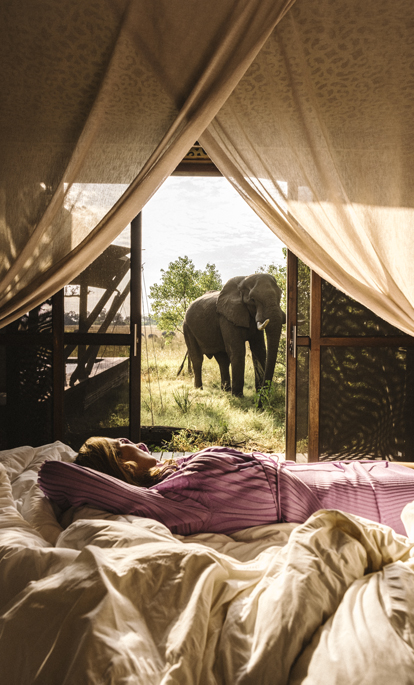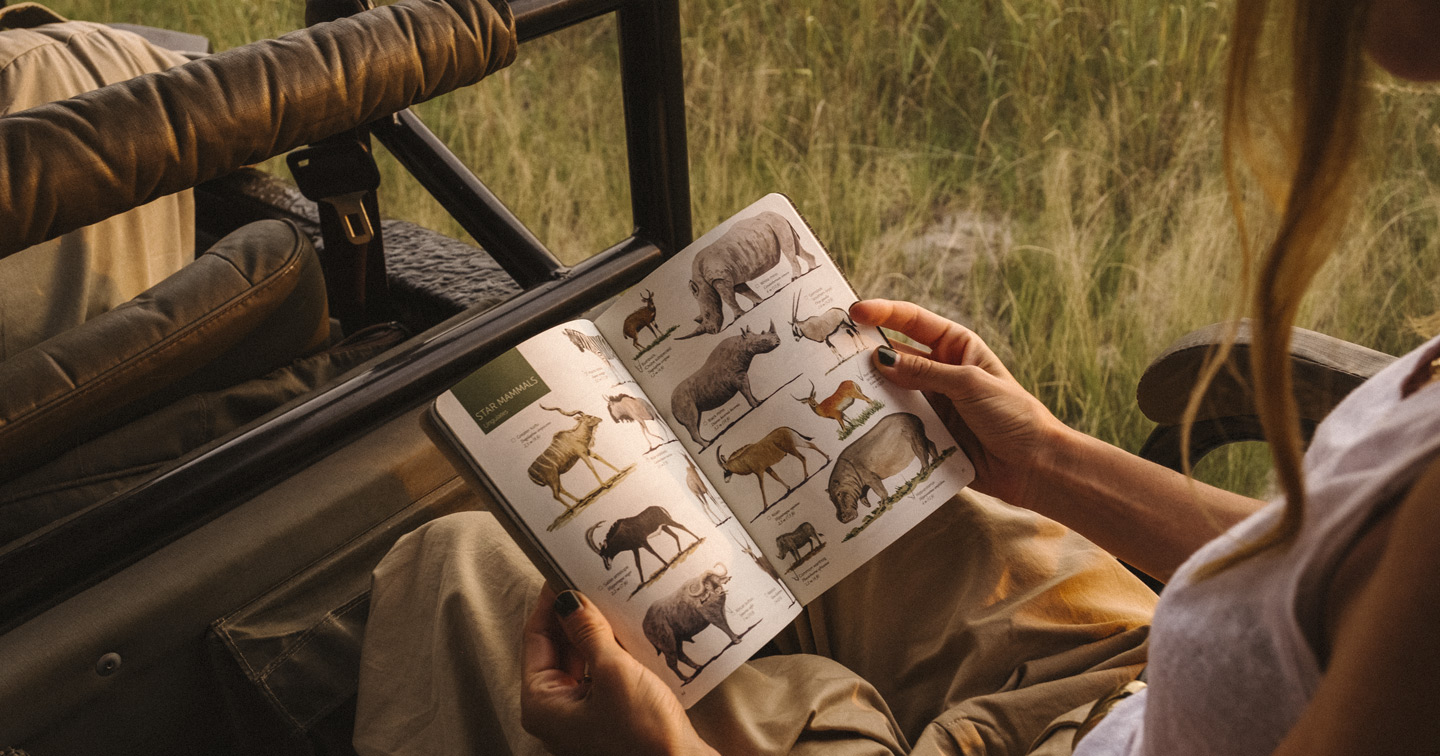
A few suggestions to get the holiday planning process started

Having spent ample time in beautiful Botswana, our consultants' expertise allows us to tailor each trip to you, whether you’d rather have meerkats scramble over you in the sandy Mkadikgadi Pans or hop on a mountain bike safari in the Mashatu Reserve. We work with incredible guides to ensure you not only see wonderful wildlife but learn about local culture, too. In-country, our Concierges keep things running smoothly, while our trusty team of local partners go the extra mile to make your trip unforgettable. From honeymooners seeking ultimate luxury to multi-generational families needing space, we’ve got your accommodation sorted.
ENQUIRE NOWDiscover different ways to explore Botswana
Practical advice and inspiration to help you prepare for your holiday
Combining over 25 years of experience, our Botswana consultants (which include a Condé Nast Top Travel Specialist) have an intimate knowledge of the country’s varied ecosystems, from the Okavango Delta to the Kalahari Desert. We've stayed at over 70 safari camps across the country, so are perfectly placed to recommend properties for all kinds of Botswana holidays. From navigating hard-to-reach areas like Tsodilo Hills to arranging a magical mokoro ride, we'll use our Botswana expertise to make your trip unforgettable. While on your trip, our friendly Concierges are on hand to offer insider advice and support.

Undoubtedly one of Botswana’s rock-star attractions and the country’s lifeblood – the Okavango Delta offers exquisite animal sightings and is one of the few places on earth where the rain is welcomed. January and February, being the wettest months, offer fruitful sightings of wildflowers, big cats hunting in the lush plains and graceful sable antelopes traversing the landscape. Within the Okavango Delta Game Reserve, you’ll find Moremi Game Reserve, which plays host to white rhinos, African wild dogs and more than 500 species of bird. The variety of landscapes on show is equally impressive, from acacia forests and mopane woodland to shimmering lagoons and expansive grasslands.
For a complete contrast, travel to the Kalahari Desert, which is home to a plethora of desert-adapted species such as brown hyenas and elegant springboks. Further north, Chobe National Park, a safari haven, boasts huge concentrations of elephants, hippos and buffaloes as well as predators. On top of that, memorable adventure beckons – horse riding across the golden Kalahari, sleeping under the stars, sundowners under giant baobab trees and quad biking across the striking Makgadikgadi pans (during the dry season) – the list goes on. Plus, you’ll find some of Africa’s swishest and most comfortable camps here – ranging from romantic pavilions, complete with four-poster beds or old school safari tents decked out with Persian rugs and antique furniture.
Botswana holidays are for discerning safari-goers looking to be astounded by enormous concentrations of extraordinary wildlife. The diverse landscapes offer the perfect backdrops for adventure-seekers who can canter on horseback alongside game or embark on thrilling walking safaris. Honeymooners can nestle into some of the most romantic camps imaginable, while enjoying next-level sofa safaris and silver service. Those interested in eco-conscious safaris can get involved with important rhino conservation – learning from experts and helping to release these gentle creatures back into the wild – a truly emotional experience. Conservation is a serious business in Botswana. The country pioneered the ‘high yield low impact’ tourism model, which means the level of exclusivity on offer in this unspoiled landscape is remarkable. It comes with a higher price tag, but it is definitely one worth paying for, in our humble opinion, because the most remarkable Botswana attribute is how truly wild the country is. Botswana holidays are also perfect for families – children can spend the day learning essential bush-craft skills, meeting meerkats and sipping mocktails by the fire pit.
Depending on how much time you have, sweep through the desert and delta, witnessing Botswana’s highlights. Cross the mesmerising Makgadikgadi Pans, camp out on a desert island of baobabs, meet the Zu’hoasi bushmen of the Western Kalahari, and see spectacular game in the Okavango Delta. Botswana can be easily combined with Mozambique, for the perfect beach antidote to a rip-roaring safari. Or perhaps consider pairing South Africa’s Winelands with cosmopolitan Cape Town or why not try a trip to the thundering Victoria Falls for maximum impact.
Looking for something a little different? After exploring the savannah in a 4x4, switch mode of transport to a Mokoro (Dugout) Canoe. An expert guide will paddle you quietly through the Okavango’s winding waterways as you spot game that you wouldn’t necessarily see on land. Keep your eyes peeled for elephants cooling off in the river, crocodiles in the shallows and cheetahs hunting in the marshlands.
Spend a day with the Kalahari bushmen – a hunter gatherer tribe whose traditional lifestyle has remained more or less intact for thousands of years. Spend half a day to four days meeting village elders, shadowing bushmen trackers and learning various hunting techniques imperative to their survival. You’ll also have the chance to join in sacred ceremonies during your trip, a special experience, especially for families.
The highlight of Botswana is undoubtedly the Okavango Delta - one of the primary wildlife hotspots in all of Africa. This is where the traditional mokoro canoe safaris really come into play; you'll be up close and personal with an incredible array of wildlife while being gently punted along a beautiful river… perfection. While we know and rate the superb lodges in the Delta offering the most exclusive safari experience imaginable, the Original Travel team also know good value lodges where you can still enjoy this incredible destination to the full.
Delta aside, there is so much more to Botswana safari holidays. The parts of the Kalahari that the waters of the Okavango River fail to refresh remain semi-arid but this is still the most species-rich desert in the world. In just as stark and rewarding a contrast are the Makgadikgadi Pans that are the size of Switzerland. We can arrange quad bike safaris across vast salt pans in the dry season, and in the rainy season there is an annual zebra and wildebeest migration to follow (with expert guides, of course), and huge flocks of flamingo congregate in the shallow water.
Our Africa specialists are passionate about the places they sell and are on hand to recommend the best mobile camps or a location where you can offer your head as a lookout platform to a wild meerkat (Makgadikgadi Pans in case you were wondering).
Botswana’s location on the Tropic of Capricorn affords it a temperate but varied climate, with two distinct seasons. Winter falls between May and August, with sunny, warm days and cool nights. This is also the dry season when almost no rainfall occurs. Summer takes place between November and March, bringing very high temperatures, as well as heavy rainfall and thunderstorms. Winter is therefore the best time to travel to Botswana, particularly during the months of June, July and September, as rainfall is at a minimum, temperatures are pleasant and there’s plenty of sunshine. Visit our guide on the best time to visit Botswana for more information.

Our team of destination experts will get to know you and your unique requirements for your holiday

We work with you to build an ultra-personalised holiday itinerary with your choice of accommodation, experiences and activities

All of our holidays include little extras designed to make a big difference to your trip, from fast-tracking you through airport check-in and security to our network of local Concierges